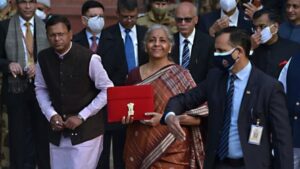ButSpeak.com
News which Matters.

Union Budget 2024-25 introduces initiatives for job creation and skilling, including Employment Linked Incentive schemes and women’s workforce participation programs, aiming to enhance workforce capabilities.
The Union Budget 2024-25, presented by Finance Minister Nirmala Sitharaman, unveiled a series of initiatives aimed at bolstering employment and skilling as part of the Prime Minister’s package. These measures are designed to boost job creation and enhance the capabilities of the workforce, reflecting the government’s commitment to building a strong job market.
A key feature of the budget is the introduction of Employment Linked Incentive schemes.
Scheme A targets first-time employees with a salary cap of INR 1 lakh per month, providing a direct benefit transfer of up to INR 15,000 in three installments. This scheme is expected to benefit 2.1 crore youth, offering them financial support as they enter the workforce.
Scheme B focuses on job creation in the manufacturing sector by incentivizing employers to contribute to the Employees’ Provident Fund Organisation (EPFO) for first-time employees over the first four years of employment. This initiative aims to benefit 30 lakh youth and their employers, encouraging the growth of manufacturing jobs.
Scheme C supports employers across all sectors by reimbursing up to INR 3,000 per month for two years towards their EPFO contributions for each new employee. This scheme is projected to incentivize the employment of 50 lakh individuals, fostering job creation on a broader scale.
FADA President Manish Raj Singhania highlighted the positive impact of these schemes, stating, “The budget’s emphasis on employment, skilling, MSMEs, and the middle class is particularly relevant for our industry. The Employment Linked Incentive scheme and the enhancement of Mudra loans are encouraging developments that will support job creation and entrepreneurship, leading to increased consumer spending power.”
The budget also addresses women’s workforce participation by proposing the establishment of working women hostels, crèches, women-specific skilling programs, and market access promotion for women Self Help Group (SHG) enterprises. These measures aim to increase women’s involvement in the workforce and provide the necessary support for their professional growth.
A new centrally sponsored skilling scheme will skill 20 lakh youth over five years, upgrading 1,000 Industrial Training Institutes (ITIs) in a hub-and-spoke model. This initiative will align course content with industry needs and introduce new courses for emerging sectors, ensuring that the workforce is equipped with relevant skills.
The Model Skill Loan Scheme will be revised to offer loans up to INR 7.5 lakh with government-guaranteed funds, expected to assist 25,000 students annually. Additionally, financial support for education loans up to INR 10 lakh for domestic institutions will be provided, with e-vouchers for annual interest subvention of 3% available to 1 lakh students each year.
These comprehensive measures demonstrate the government’s commitment to creating a robust job market and equipping the youth with the necessary skills for future opportunities. Anuj Jhunjhunwala, CEO of JJG Machining Group, praised the budget, stating, “The government’s subsidy for formal employment, covering one month’s salary for new hires and EPFO contributions for two years, along with a focus on skilling and relaxed internship rules, is a significant positive.”
Dr. Vijay Kalantri, Chairman of WTC Mumbai, and President of the All India Association of Industries, also welcomed the budget, highlighting its focus on increasing Mudra loan limits, enhancing credit guarantee funds for MSMEs, and skilling 4.1 crore youth. He stated, “By introducing a skilling program for 4.1 crore youngsters, energy security measures, and reforms to accelerate insolvency proceedings, the Union Budget FY25 has established the path for a USD 40 trillion GDP vision.”
The Union Budget 2024-25 aims to advance India’s economic growth by prioritizing employment and skilling, ensuring that the workforce is prepared for the challenges and opportunities of the future.